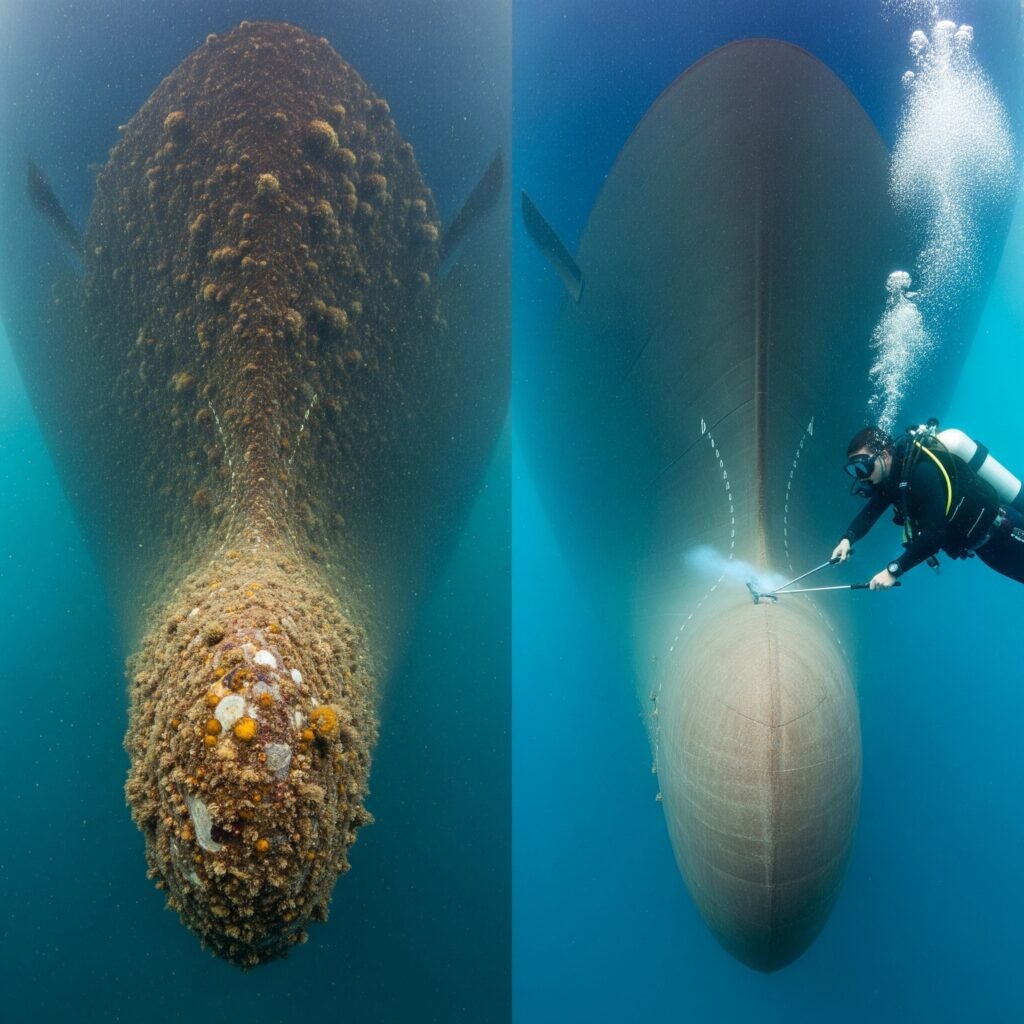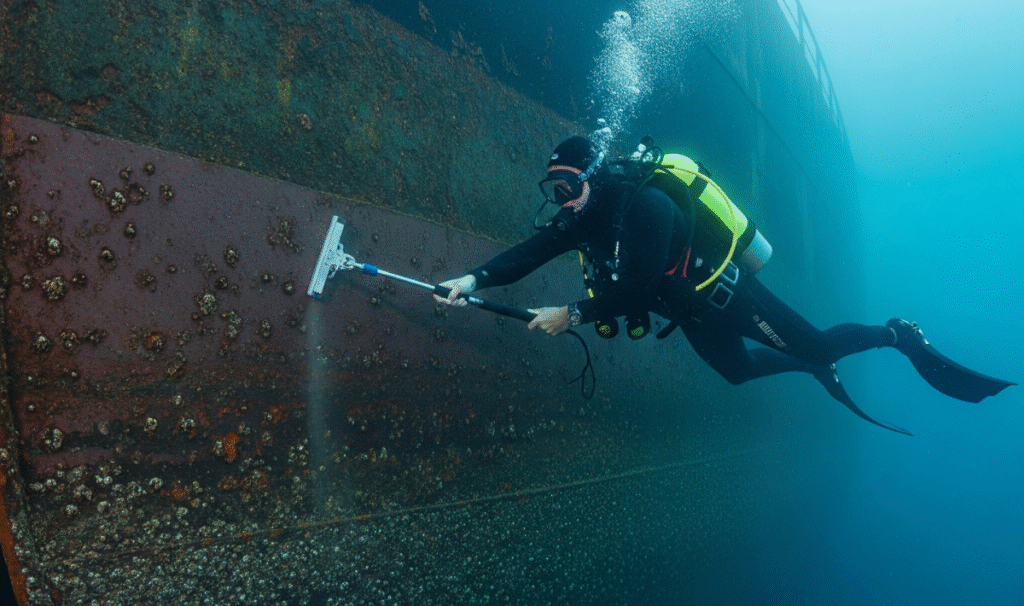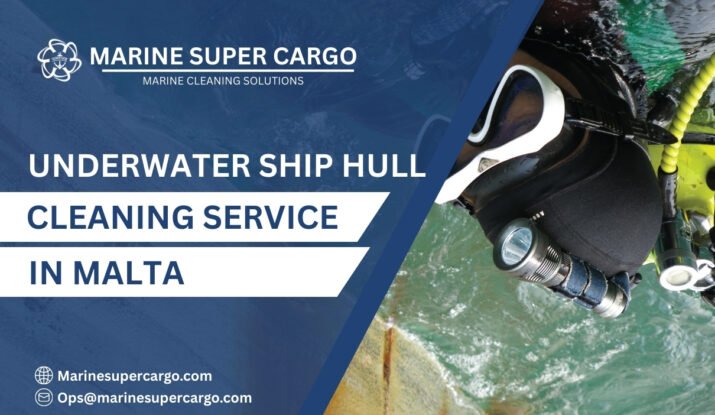Picture Malta—not only dazzling with golden coastlines, but also pulsing quietly as one of the busiest maritime crossroads in the Mediterranean. For centuries, ships have passed through these waters, anchoring in harbors that date back to the Phoenicians and Knights of St. John. Today, Malta stands not only as a breathtaking destination but also as a maritime hub where global shipping meets world-class infrastructure.
One of the most essential services vessels seek here is underwater ship hull cleaning in Malta. What seems like a routine chore beneath the waves carries massive implications for cost efficiency, safety, and environmental responsibility. Let’s explore the underwater ship hull cleaning in Malta and why it’s essential for shipowners navigating the Mediterranean and beyond.
Understanding Underwater Ship Hull Cleaning in Malta
At its simplest, hull cleaning is about removing marine organisms—barnacles, algae, and slimy coatings—that stick to a ship’s hull, a phenomenon called biofouling. This growth turns a sleek, hydrodynamic vessel into something that resembles dragging a carpet underwater. The result? Slower speeds, higher fuel consumption, and greater wear and tear.
Professional divers (and increasingly, robotic systems) carry out hull cleaning using brushes, scrapers, or water-jet systems. In Malta, this process is performed with precision, expertise, and eco-conscious practices that align with global maritime regulations.
The Drag Problem: How Biofouling Wastes Energy to Underwater Ship Hull Cleaning in Malta
Imagine pedaling a bicycle with flat tires. You’ll move forward, but every push demands more exertion. That’s exactly what happens when a ship’s hull suffers buildup. Biofouling increases hydrodynamic drag, forcing engines to burn up to 30–40% more fuel.
Fuel is one of the largest expenses in shipping. When vessels continually waste it because of fouled hulls, the financial hit is massive.

Smooth Hulls, Swift Journeys, and Lower Bills
With underwater ship hull cleaning in Malta, shipowners unlock dramatic fuel efficiency improvements. A clean hull means less resistance and smoother sailing. This translates into shorter voyage times, reduced bunker costs, and lower carbon emissions.
From a financial perspective, the return on investment is clear—regular cleaning in Malta pays for itself quickly, often within a couple of voyages.
Corrosion Control and Structural Health
Marine growth isn’t just ugly slime—it holds moisture against ship surfaces, speeds up corrosion, and eats away protective coatings. Left unchecked, this can shorten a vessel’s lifespan dramatically.
Cleaning acts like preventive medicine, removing biofouling before it triggers large-scale, costly damage. For operators investing in underwater ship hull cleaning in Malta, this means fewer repair bills and stronger long-term seaworthiness.
Meeting Strict Safety Standards at Sea
The global shipping industry is governed by regulations designed to safeguard lives, cargo, and oceans. The International Maritime Organization (IMO) enforces strict requirements, including inspections that demand clean, operational hulls. Failing to comply can mean costly delays or penalties.
By scheduling professional cleaning in Malta, shipowners stay ahead of compliance checks while ensuring their ships remain safe, efficient, and durable.
Reducing Carbon Emissions Through Efficiency
Every ton of fuel burned releases tons of carbon dioxide. Shipping contributes nearly 3% of global greenhouse gas emissions, according to imo.org. A fouled hull makes this worse since higher fuel demand means higher emissions.
Clean hulls reduce drag, cut fuel consumption, and directly lower emissions. Through underwater ship hull cleaning in Malta, shipowners contribute to global sustainability targets while saving money.
Stopping the Spread of Invasive Species
The MARPOL Convention underscores another pressing concern: invasive species. Marine organisms clinging to hulls often “hitchhike” across oceans, threatening delicate ecosystems.
Regular cleaning reduces this risk dramatically. By maintaining biofouling-free hulls in Maltese waters, operators protect the Mediterranean’s biodiversity.
Strategic Mediterranean Shipping Hub
Malta lies at the center of east-west maritime routes. For ships already passing by, stopping here for underwater ship hull cleaning in Malta saves time compared to detours into northern European ports.
Skilled Professionals and Marine Infrastructure
The island has a long maritime tradition supported by advanced shipyards, skilled divers, and international-standard practices such as those shared by imca-int.com and iaphworldports.org. This makes Malta an excellent destination for efficient, eco-conscious maintenance.
IMO and MARPOL Compliance for Underwater Ship Hull Cleaning in Malta
The IMO and MARPOL conventions shape global expectations for cleaner seas and safer voyages. Regular hull cleaning is critical for meeting both operational efficiency benchmarks and ecological commitments.
Best Practices from IMCA and IAPH
Organizations like IMCA (International Marine Contractors Association) and IAPH (International Association of Ports and Harbors) recommend structured hull-maintenance schedules. Malta’s industry has aligned itself with these practices, ensuring ships comply with international norms while safeguarding the Mediterranean environment.
How the Underwater Ship Hull Cleaning in Malta Process Works
Five Key Stages of Cleaning
- Initial Assessment – Trained divers inspect the hull’s fouling level.
- Biofouling Removal – Algae, barnacles, and slime scraped off using brushes or cavitation devices.
- Rinse & Polish – Surfaces polished for optimal smoothness.
- Final Inspection – Ensures coatings remain intact and debris is collected responsibly.
- Reporting – Compliance records prepared for operators.
Modern Tools and Technology Used
From advanced suction filtration systems to remotely operated vehicles (ROVs), Malta employs the latest tech to complete hull cleaning efficiently and sustainably.
Finding the Right Balance in Frequency
Too much cleaning risks damaging anti-fouling coatings, while too little allows drag to skyrocket. The sweet spot? Generally, every 6–12 months, though warm regions like Malta often require slightly more frequent schedules.
Scheduling strategic underwater ship hull cleaning in Malta ensures maximum cost savings without overburdening the hull.
Local Environmental Factors in Malta
The Mediterranean’s warm, nutrient-rich waters encourage rapid biofouling growth. Ships resting in Maltese ports for extended periods are especially prone. This makes regular hull cleaning indispensable in this region.

Eco-Friendly Coatings and Cleaning Methods
Innovations in coatings are reducing how easily marine life attaches to ships. Biocide-free paints and slick, nano-material coatings may one day make extended fouling-free periods a reality for vessels in Malta.
AI, Robotics, and Predictive Maintenance
The future isn’t just about brushes and divers. AI-driven monitoring systems will soon tell shipowners precisely when hull resistance rises—triggering underwater ship hull cleaning in Malta only when economically necessary. Robotic cleaners may one day replace most manual work entirely.
Conclusion
The sea doesn’t forgive neglect—allow hulls to become clogged with growth, and fuel costs, operational risks, and emissions will rise sharply. However, by embracing regular underwater ship hull cleaning in Malta, shipowners gain smoother voyages, safer vessels, and more sustainable operations. Partnering with trusted professionals like CleanShip.co ensures efficiency, compliance, and environmental responsibility, turning maintenance into long-term maritime success.
The underwater ship hull cleaning in Malta is clear:
- Major fuel and cost savings thanks to reduced drag.
- Greater vessel durability and safety compliance.
- Significant positive impact on environmental protection.
For ships crossing the Mediterranean, Malta offers the expertise, location, and facilities to make hull maintenance not just convenient, but smart, safe, and sustainable.
FAQ:
Q1. How often should ships undergo underwater hull cleaning in Malta?
Every 6–12 months is recommended, though warmer waters like Malta often require more frequent schedules.
Q2. Does hull cleaning damage anti-fouling coatings?
Not when done by trained professionals. Techniques in Malta are designed to preserve protective layers while removing biofouling.
Q3. Can underwater hull cleaning reduce greenhouse gas emissions?
Yes. By lowering drag and cutting fuel consumption, each cleaning directly reduces a vessel’s carbon footprint.
Q4. Why is Malta considered a prime location for hull maintenance?
Its central location on Mediterranean trade routes and advanced facilities make it both cost-effective and convenient.
Q5. Are invasive species really an issue on ship hulls?
Yes. Organisms can spread globally via ships, disrupting ecosystems. Regular cleaning in Malta minimizes this risk.


